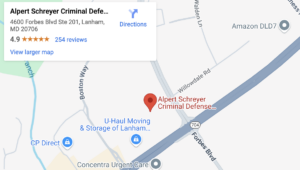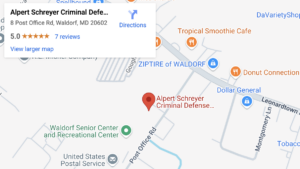
Are you being charged with a drug crime in Waldorf, MD? Maryland takes drug crimes very seriously. Depending on the crime, you could face penalties ranging from probation to a prison sentence.
If you are being charged with a drug crime, a Waldorf drug crimes lawyer can defend you. The legal team at Alpert Schreyer Criminal Defense Attorneys has over 125 years of combined experience. We have helped many people get reduced sentences and avoid convictions for drug crimes. Our lawyers are passionate about protecting people’s freedom.
Call our law office today at (301) 857-4771 to schedule a free consultation with a Waldorf drug crimes attorney.
How Our Waldorf Criminal Defense Attorneys Can Help If You Are Arrested For A Drug Crime In Waldorf, MD

In any drug case, the prosecution has the benefit of an entire team of lawyers, police, and forensic examiners. They will work together to try and convict you. It is almost impossible to avoid a conviction without a lawyer.
Alpert Schreyer Criminal Defense Attorneys can protect you from the government. We can help you avoid a conviction, jail time, and fallout from the case. Our Waldorf criminal defense attorneys are locally and nationally recognized by leading legal organizations such as The National Trial Lawyers, Super Lawyers, and Martindale-Hubbell.
When clients call us to defend them against drug crimes in Waldorf, Maryland, they can count on us to:
- Clearly explain the law and the penalties they are facing
- File bond motions
- Collect and review the evidence
- Negotiate with the prosecutors
- File pretrial motions
- Identify the strongest defenses
- Represent them at every court hearing
- Defend them in front of a jury at trial
Our Waldorf drug crimes lawyers pride ourselves on protecting each client’s privacy. We won’t share the details of your case with anyone without your permission.
The first step is to call our office for a free consultation and speak with a Waldorf drug crimes attorney today.
Types Of Drug Crimes In Maryland
Drug crimes are a broad category of criminal offenses relating to controlled substances. Like the federal government and most states, Maryland has classified certain drugs as dangerous. These drugs are either strictly regulated or entirely illegal. They range from legal prescription drugs to drugs with no recognized legitimate purpose.
Controlled Dangerous Substances In Maryland
Maryland follows a drug classification scheme similar to that of the federal government. Drugs are divided into 5 schedules depending on their qualities. Most drug crimes relate to Schedule I or Schedule II substances.
Schedule I drugs have a high potential for abuse, no accepted medical use, and a lack of safety for use under medical supervision. This includes drugs like:
- Heroin
- LSD
- Ecstasy
- Fentanyl
Schedule II substances also have a high potential for abuse that could lead to severe psychological or physical dependence, but have a currently accepted medical use. Examples of schedule II substances are:
- Cocaine
- Morphine
- Hydrocodone (Vicodin)
- Codeine
- Opium
- Methamphetamine
Usually, people charged with Schedule II drug crimes are facing prescription drug crimes.
Common Drug Crimes
The most common drug crimes in Waldorf, MD include:
- Drug possession
- Drug distribution
- Drug trafficking
- Possession of drug paraphernalia
- Prescription drug fraud
- Drug manufacturing
- Drug DUI
Drug charges can range in severity. Some charges are classified as a misdemeanor, and others are considered a felony. Any drug charge can significantly impact your life and should be taken seriously.
What Are the Penalties For A Drug Conviction In Waldorf, Maryland?
If you are convicted of a drug crime in Waldorf, the penalty may vary depending on factors like:
- The type of charge
- The type and amount of drugs
- The facts of the case
- Your prior criminal record
An attorney can help you understand the possible consequences of a conviction and minimize them if you are convicted.
Drug Possession
Possession of a controlled dangerous substance is usually a misdemeanor offense. The exception is possession of marijuana, which is legal in certain quantities (up to 1.5 ounces) for someone over 21.
The penalty for misdemeanor drug possession first offense is up to 1 year in jail and a $5,000 fine. A second or third offense carries up to 18 months in jail, while a fourth or subsequent offense carries up to 2 years in jail. Both also carry the potential of a fine of up to $5,000.
Drug Distribution
Distributing a controlled substance is a much more serious crime than possession.
For most Schedule I or Schedule II drugs, a person can face up to 20 years in prison and a $15,000 fine. The amount of prison time increases up to 40 years, depending on whether the person has previously been convicted of drug distribution.
Additionally, there are increased penalties for the distribution of certain types of drugs, including heroin or fentanyl, LSD, and PCP. For example, if you are convicted of distributing heroin or fentanyl, your sentence may be increased by 10 additional years in prison.
If you are convicted of distributing a Schedule III, IV, or V drug, you may receive up to 5 years in prison and a $15,000 fine.
Drug Trafficking
Drug trafficking is a complicated crime. It usually includes importing certain large quantities of drugs across state lines. Technically, drug trafficking doesn’t have to include the intent to distribute, but it usually does.
The penalty for drug trafficking is up to 25 years in prison and a $25,000 fine.
Mandatory Minimums
Certain possession, distribution, or manufacturing-related charges also carry a mandatory minimum sentence of 5 years in prison and a $100,000 fine.
It applies to cases involving:
- Marijuana: 50 pounds or more
- Cocaine: 448 grams or more
- Opium or Morphine: 28 grams or more
- Fentanyl: 5 grams or more
- LSD: 1,000 dosages or more
- PCP: 16 ounces or more
- Methamphetamine: 448 grams or more
The mandatory minimum sentence is in addition to the other criminal penalties that come with the charge.
What Defenses Can Be Raised If I Am Accused Of A Drug Crime In Waldorf, Maryland?
Luckily, you have an opportunity to defend yourself if you are accused of a drug crime in Waldorf, MD. The prosecution has the burden of proving the case against you.
There are many defenses available depending on the charge type and facts of the case. An experienced Waldorf drug crimes lawyer can help you build the strongest possible defense.
Lack of Intent
Most drug crimes have an element of intent. This applies to possession, distribution, and trafficking cases, for example. The prosecution must prove that you intentionally committed the crime to secure a conviction against you. In drug cases, this is usually when you intentionally or knowingly committed the crime.
The prosecution doesn’t need to prove that you knew you were committing a crime, though most people know when they have committed a drug crime. In a drug possession case, for example, they must show that you intentionally possessed the drugs. That means that you were aware of their existence.
Procedural Defenses
You may have a procedural defense available in your drug case. A procedural defense is an argument that someone violated your rights. It could be the police, the prosecutor, or some other government actor.
With a procedural defense, you aren’t arguing that you didn’t commit the crime. Instead, you argue that the government made a mistake and, therefore, you cannot be prosecuted. Sometimes, the solution is to dismiss the case; other times, it is to suppress evidence.
Many lawyers will raise procedural defenses during pretrial motions or negotiations with the prosecutor.
Entrapment
Entrapment is an affirmative defense available to those who are coerced into committing a drug crime by the police. This is common in situations involving an undercover police or a setup. An affirmative defense is one where the defendant must provide evidence to support their defense. To prove entrapment, the defendant must show that they:
- Were not predisposed to commit the crime
- Were induced or persuaded by the police (or their actor) to commit the crime
It can be difficult to prove entrapment. It may be hard to show that you were not predisposed to commit the crime. Usually, this applies in situations where the defendant has no prior criminal record and has never had any drug-involved history. Furthermore, the defendant is commonly provided the drugs and a substantial sum of money or other significant benefit to committing the crime.
Failure to Meet Burden of Proof
In every case, including drug cases, the prosecution must prove the charge beyond a reasonable doubt. If they fail to prove even a single element of the charge, you cannot be convicted.
A defendant has the opportunity to poke holes in the prosecutor’s case and argue that they have failed to meet their burden of proof. Ultimately, any jury verdict must be unanimous, and creating doubt for one juror can be enough for an acquittal.
Contact Our Waldorf Drug Crimes Lawyers For A Free Consultation
The best chance that you have to beat your drug case is to talk to a Waldorf drug crimes lawyer at Alpert Schreyer Criminal Defense Attorneys. We are available to discuss your case and begin fighting for your freedom. Call us to schedule a free consultation today.




